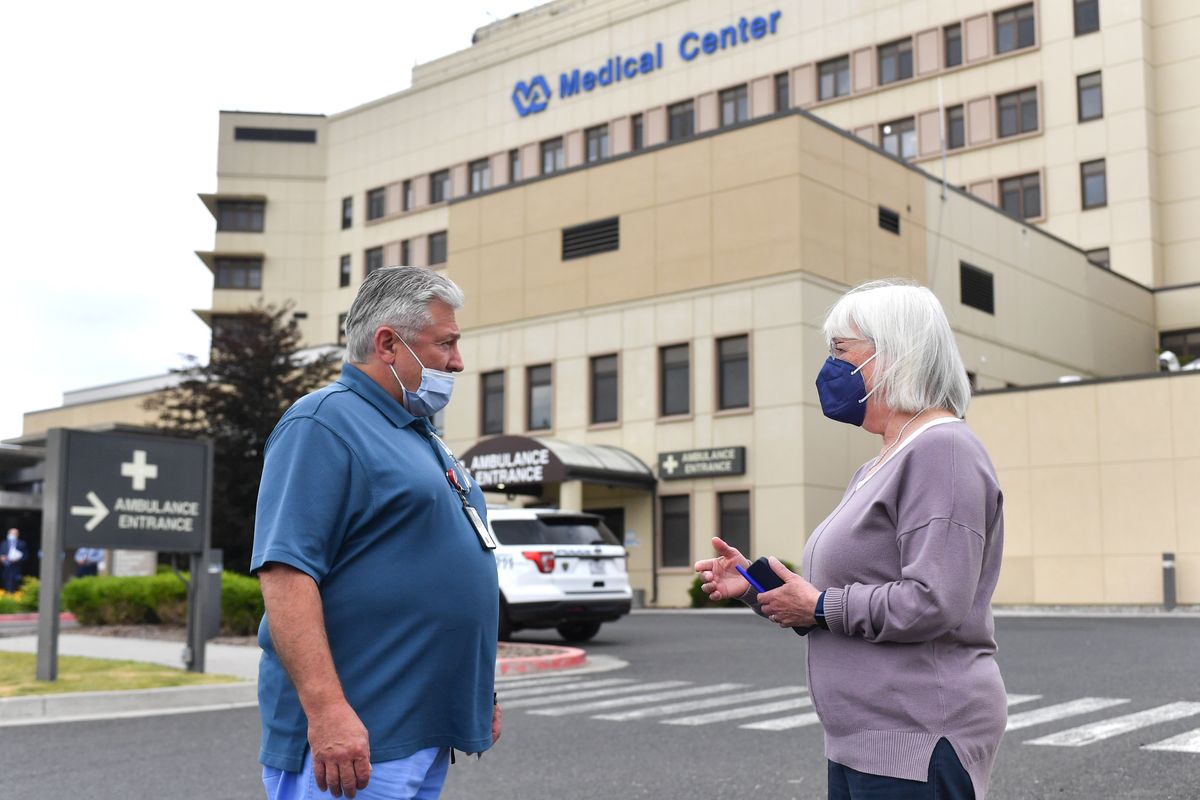After visiting Spokane VA medical center, Patty Murray says she remains committed to fixing computer system that has harmed veterans

Before visiting Mann-Grandstaff VA Medical Center in Spokane on Thursday, Sen. Patty Murray said she is committed to fixing a faulty computer system that has threatened patient safety since the Department of Veterans Affairs began piloting it in the Inland Northwest in October 2020.
The Washington Democrat, who holds key positions on the Senate committees that provide both oversight and funding to the effort projected to cost at least $21 billion over a decade, unsuccessfully called on VA Secretary Denis McDonough to halt the system’s launch in Walla Walla and other Northwest towns until problems were fixed. A draft report by the VA Office of Inspector General found senior VA officials approved the system’s continued rollout despite being warned months earlier a problem that harmed 148 veterans had not been fully resolved.
“The doctors and nurses and everyone working here at Mann-Grandstaff really care about their work and they care about their mission, but right now they are bogged down by a faulty electronic health record system that is not working for them,” Murray told reporters before meeting with veterans and employees at the hospital.
Murray’s visit to Spokane came after Rep. Dan Newhouse, a Republican who represents Central Washington, met with veterans and employees at Walla Walla’s VA medical center and a VA clinic in Richland on Tuesday and Wednesday. In a statement Thursday, Newhouse said he had heard a clear message from those veterans and staff: The system “is not providing the care our veterans need and deserve.”
According to the draft watchdog report, obtained by The Spokesman-Review, a problem with the system caused referral orders submitted by doctors and nurses not to be delivered to their intended recipients, resulting in delayed care and 148 cases of harm identified by a VA patient safety team.
“I am committed to ensuring our veterans, the men and women who have put their lives on the line for us, receive this care where and when they need it,” Newhouse said in the statement. “I call on the Biden administration to immediately deploy resources to the Spokane and Walla Walla VA hospitals to ensure no more records are lost and no more veterans are harmed.”
After The Spokesman-Review notified the VA it had obtained the draft Inspector General report, the department announced it would delay a planned launch of the system in the Puget Sound region from August until March . Days later, the system’s deployment at the Boise VA Medical Center was pushed back by a month to July 23.
In Spokane on Thursday, Murray took credit for McDonough’s decision to delay the rollout in Seattle and other sites west of the Cascades, saying bringing the system to those larger, more complex facilities before fixing the problems would be “catastrophic.”
When a reporter asked Murray what it would take for her to consider putting a permanent stop to the project, something she is uniquely positioned to do as a member of the Senate Appropriations Committee, the senator said she was still committed to seeing the effort through.
“The system that we had prior was outdated and not working,” she said. “That has not changed. But that fact is, until we get this right – and it is not yet right – we need to fix it and we need to really have the VA and the administration focus on getting this done and then expand it to other people.”
The new system, developed by Cerner Corp. in a $10 billion contract signed in 2018 without going through a competitive bidding process, is intended to replace the existing electronic health record still used by nearly all of the VA’s more than 1,200 facilities nationwide, which remains popular with users. Murray said she had recently spoken with executives at the tech giant Oracle, which acquired Cerner in a $28.3 billion deal that closed in June.
While conceding she is not an expert in electronic health records, Murray said Oracle and VA leaders have assured her they are working quickly to address problems with the system. Still, she said, “I will believe them when I see it.”
On Wednesday, Oracle Executive Vice President Kenneth Glueck sent a letter to the top members of a House subcommittee charged with oversight of the system’s rollout, Rep. Frank Mrvan, D-Ind., and Rep. Matt Rosendale, R-Mont. In it, Glueck told the lawmakers Oracle was doing a “thorough analysis” of the system, including the issue that causes referral orders to effectively go missing.
Contradicting a central claim of the draft Inspector General report, the Oracle executive asserted that officials from the VA and the Department of Defense – which is implementing a similar Cerner system – decided in January 2020 to use the feature that caused the missing orders. If true, at least some of the blame for the harm would shift to VA officials who failed to inform doctors and nurses of the potential risk.
After its planned launch at the Boise VA Medical Center and its affiliated clinics in Oregon and Idaho on July 23, the Cerner system is not scheduled for deployment at other sites until early 2023.
In June, President Joe Biden signed a bill into law that requires the VA to send reports to Congress every three months on the status and cost of the 10-year project, which is already behind schedule and whose total cost remains unclear.
Spokesman-Review reporter Kip Hill contributed to this report.